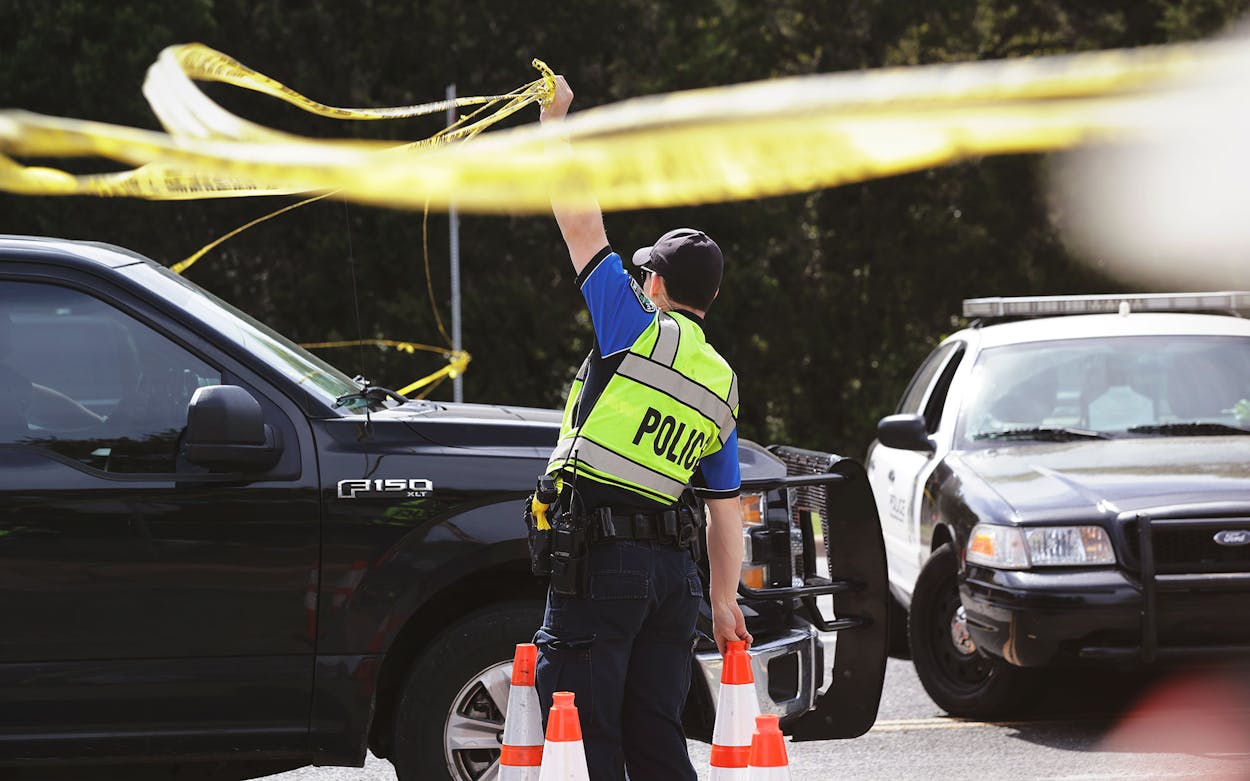Amid a drumbeat of terrifying news about bombings in Austin and at a FedEx sorting facility in Schertz, outside of San Antonio, it was possible to miss perhaps the most encouraging piece of news yet about the unfolding saga. Buried within an official statement about the Schertz incident, FedEx announced: “We have provided law enforcement responsible for this investigation extensive evidence related to these packages and the individual that shipped them collected from our advanced technology security systems.”
In other words: FedEx has the first actual lead we’ve heard mentioned. Knowing authorities might finally be on the bomber’s trail goes a little way toward assuaging the fear that’s swept Austin in recent days.
But the bomber hasn’t yet been caught, and it’s peak season in the Capital City, with crowded festivals every week and comfortable temperatures drawing residents out to the trails and parks. Until a suspect or suspects are caught, businesses and other institutions remain on high alert, and officials continue to urge people who live in Austin, or who are visiting, to be mindful of their surroundings and let the experts do their jobs.
The PGA Tour, whose Dell Match Play golf tournament begins Wednesday at the Austin Country Club, has stepped up security, although it declined to identify exactly what additional precautions they were taking. “We don’t talk specifically about the policies we are putting in place,” a spokesperson told us. “But we have security professionals that work for the Tour that are working with local, state, and federal law enforcement.” She suggested tournament attendees look at the Tour’s updated prohibited-items policy and follow it closely.
At UT-Austin, where students returned from spring break to a city on edge, campus police have increased patrols and begun “regular sweeps of the mailroom with our bomb-detection canines,” according to Director of Internal Communications Cindy Posey. (Yes, UT has its own bomb dogs.)
K-9 Jarno is hard at work to keep you safe! @UTAustinPolice are conducting sweeps in mailrooms & other areas around campus. We continue to monitor local events of concern. REMEMBER #SeeSomethingSaySomething CALL 9-1-1! Call Jarno! pic.twitter.com/gFgXXjz2c4
— UT Austin Police (@UTAustinPolice) March 20, 2018
UTPD also has encouraged members of the community to be vigilant themselves and report anything suspicious to 911 immediately. It has also asked students to keep track of their own things to eliminate potential scares: “We are asking everyone in our community to keep personal items on their person and not laying around,” Posey said.
Additionally: “Put your cell phone down when you’re walking. Take your earbuds out,” she said. That last, as simple as it sounds, is perhaps the most specific tip anyone has offered in the aftermath of Sunday’s bombing in the Travis Country neighborhood, a blast that was triggered by a nearly invisible trip wire that ran across a sidewalk.
Ever since two package bombs appeared on doorsteps in Austin a week earlier, the Austin Police Department has been offering similarly situation-specific guidance about picking up your mail: “If you didn’t order something, if you are not expecting a package, if it doesn’t have an official label on it, really if there’s anything out of the ordinary, we are asking the community to please call 9-1-1, let our officers come out, and let us handle it.”
APD is asking the public to remain vigilant and report anything suspicious. If you come across ANYTHING that looks suspicious, DO NOT touch, handle or disturb it. Keep a safe distance and call 9-1-1 immediately. pic.twitter.com/Dk0uWVcJiP
— Austin Police Dept (@Austin_Police) March 20, 2018
With two separate incidents at FedEx facilities in the past 24 hours, perhaps how our mail is screened and handled is one of the most pressing questions. In addition to its revelation of “extensive evidence,” FedEx’s statement explained that it had identified a second package before it detonated. The company didn’t explain just how it did that, but the U.S. Postal Service explained its own version of that process in slightly more detail. An official USPS statement sent to Texas Monthly says that the government agency monitors the mail with “a targeted strategy of specialized technology, screening protocols and employee training. The Postal Inspection Service has organized response teams nationwide for investigating suspicious parcels through our Dangerous Mail Investigations (DMI) Program.”
Beyond that, the Postal Service essentially asks people to trust the system. “In order to prevent attempts to compromise the effectiveness of our investigative methods,” the statement continued, “the U.S. Postal Inspection Service does not comment publicly on our investigative procedures and operational protocols.” It’s careful wording, to be sure, but comforting in its own way.








